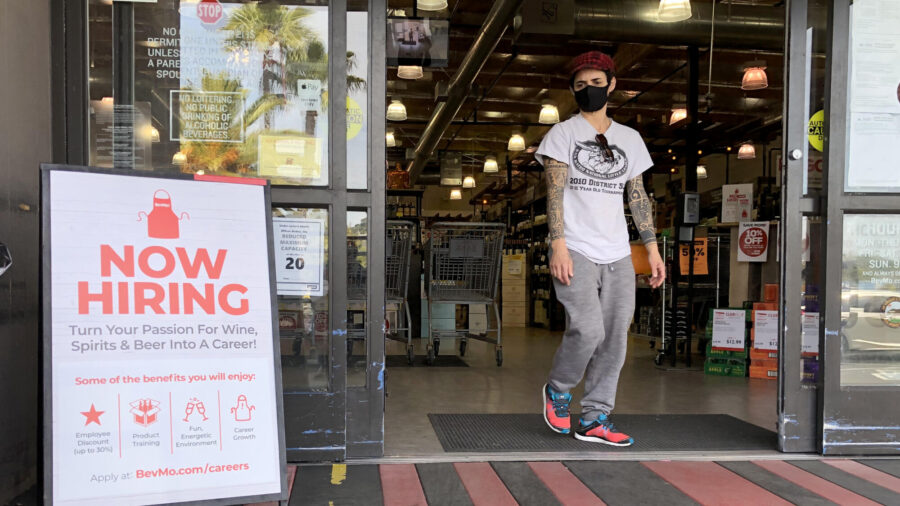WASHINGTON–Although inflationary pressures keep building in the U.S. economy, economists believe Federal Reserve officials are unlikely to tighten monetary policy before seeing significant improvement in labor markets.
From gas to groceries, Americans have started to see price increases in recent weeks as the economy reopens. Used car and truck prices, for example, surged 21 percent year-over-year, including a 10 percent increase in April alone.
Surveys also show that U.S. businesses are raising prices for their goods and services at a rate not seen since the late 1970s and early 1980s, when inflation was running at double-digit rates.
Thirty-six percent of small business owners reported that they raised average selling prices in April, up 10 percentage points over the March reading, according to the National Federation of Independent Business. This was the highest level since 1981, when it was 43 percent. Price increases were most common in wholesale and retail businesses, according to the survey.
The Fed officials have repeatedly said the price increases are “transitory,” with the expectation that inflation will eventually moderate back to the central bank’s 2 percent target.
The upward pressure on prices is “caused by this artificial shutdown in the economy, which should have never happened,” according to Lance Roberts, chief investment strategist at RIA Advisors. In an interview with NTD Business, Roberts said the government has created this “pressure cooker” by compressing economic activities during the pandemic.
“Now they’re all about to get released at one time, and unfortunately, this is going to really put the Fed into a box,” he said.
While some price increases could be transitory, he said, many Americans, especially those living paycheck to paycheck, would be hit by inflation.
“They’re going to curtail spending and that’s going to impact economic growth,” Roberts said.
The consumer price index soared last month above economists’ expectations and by the most in more than a decade. The index jumped by 4.2 percent for the 12 months ending in April, compared to 2.6 percent in March. That was the largest monthly gain since September 2008.
A 25.1 percent spike in energy costs drove much of the increase, with gasoline prices surging 49.6 percent and energy commodities rising by 47.9 percent in April.
Meanwhile, car rental prices, airline fares, and hotel rates are also surging as they continue to benefit from economic reopening and pent-up demand.
Worldwide commodity shortages due to supply chain disruptions have also led to higher prices for many raw materials from lumber and grains to iron ore and copper.
In a speech on May 12 at the National Association of Business Economics Symposium, Fed Vice Chairman Richard Clarida repeated the Fed’s “transitory” rhetoric about the inflation expectation.
“Over the next few months, 12-month measures of inflation are expected to move above our 2 percent longer-run goal, largely reflecting, I believe, transitory factors such as a run of year-over-year comparisons with depressed service-sector prices recorded last spring as well as the emergence of some supply bottlenecks that may limit how quickly production can rebound in certain sectors,” he said.
Economists don’t expect Fed officials to change this rhetoric unless the increase in prices proves sustainable.
“If sustained, we would expect the rhetoric from the Fed around inflation expectations to shift towards cautious optimism going forward,” Deutsche Bank economists stated in a report.
“As of now, however, we do not expect the Fed to express much concern about the recent rise in inflation expectations nor alter their messaging with respect to the near-term policy trajectory.”
The Fed signaled that it would keep rates near zero through 2023 and ruled out any tapering of asset purchases in the near term before seeing significant improvement in the labor market.
Since March last year, the central bank has been pumping unprecedented amounts of money into the system by buying large sums of Treasury bonds and mortgage-backed securities in the market.
Prominent economists have been raising concerns that the central bank may end up waiting too long before reacting to inflation.
The Fed officials should start to voice more concern about the inflation risk, according to Democratic economist Larry Summers, who served as Treasury secretary under President Bill Clinton and as a top economic adviser to President Barack Obama.
“All the evidence is that inflation is a terrible thing for the poor,” Summers said during a webinar hosted by the Council on Foreign Relations.
“The Fed has traditionally acted and spoken in ways that were designed to preempt inflation fears. Today, the Fed speaks in a way that’s designed to preempt the idea that the Fed might have inflation fears.”
Tom Ozimek contributed to this report.
From The Epoch Times


